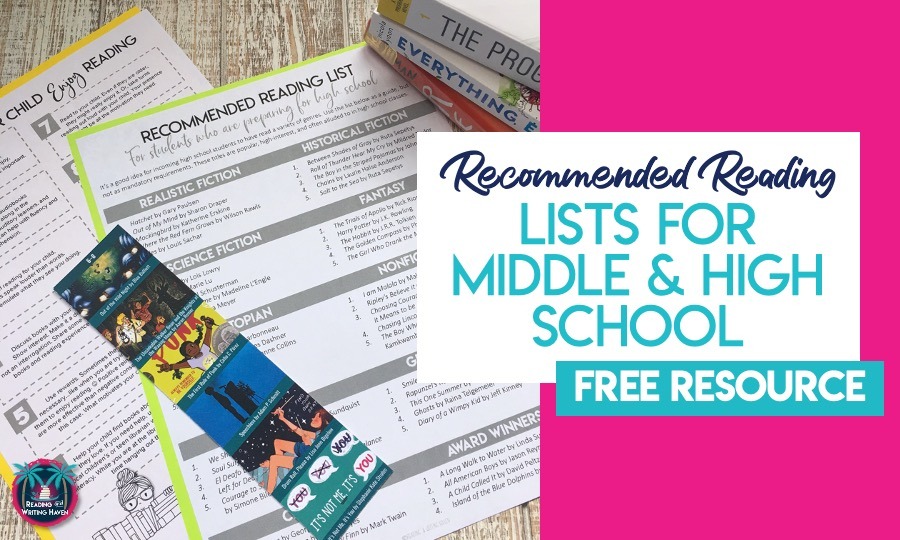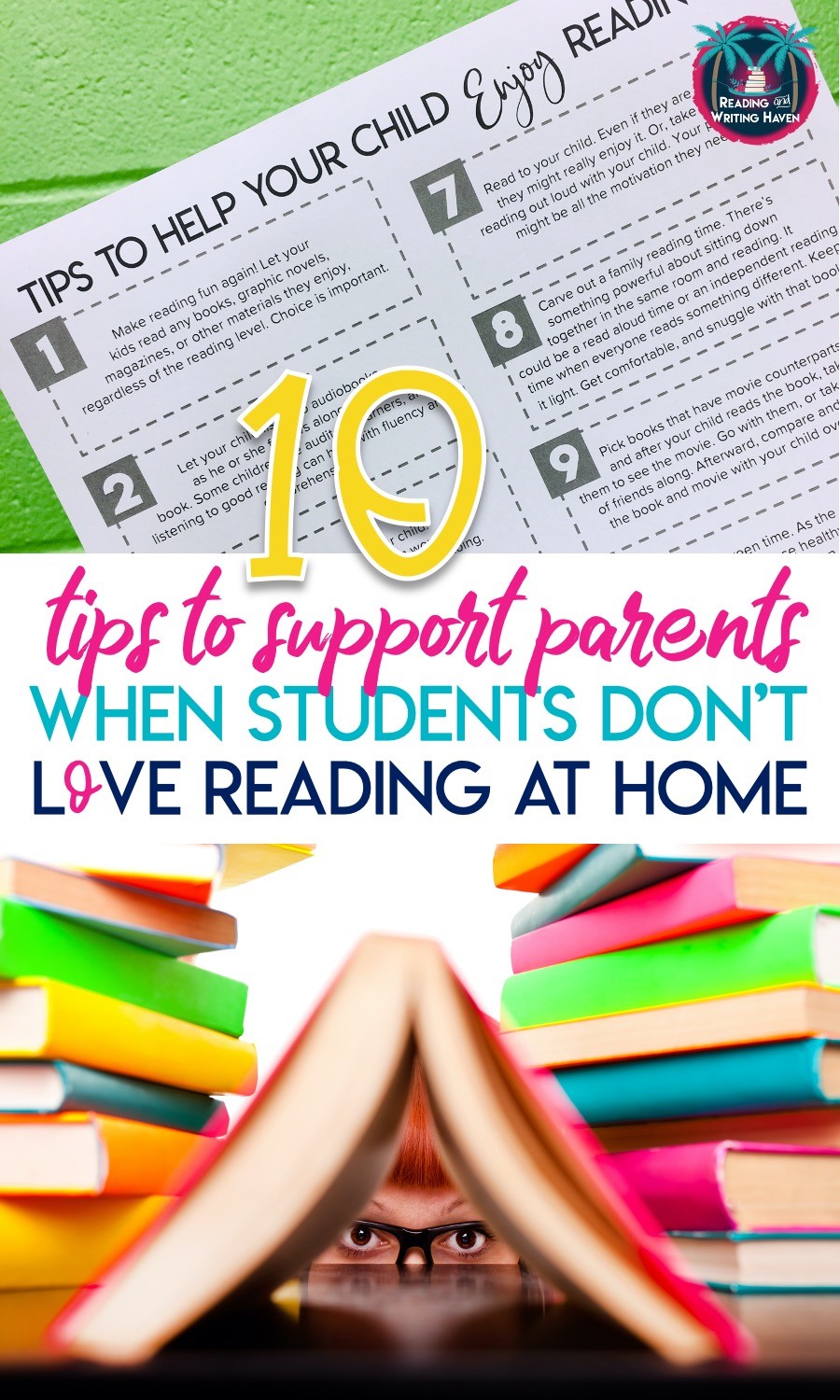What to Do When Students Hate Reading: 10 Tips to Empower Parents
Do you know a teen who doesn’t enjoy…perhaps even “hates” reading? Literacy is important! Teachers can use these ideas for creating positive reading cultures in their classrooms or share them with parents.
At least several times each year, parents approach me with a common concern: Their child hates reading. It always breaks my heart to hear these words, but I know why it happens. As children grow older, they experience heavier homework loads, more intense projects and tests, and stressful programs like Accelerated Reader. Simultaneously, their older age affords them more freedom with their time and exposes them to new hobbies they prefer over reading (video games, for example).
I’m not saying that teachers shouldn’t assign homework, that purposeful assessments are not necessary, or that kids shouldn’t play video games. I’m just stating the obvious. Those are some of the reasons why older students think they dislike reading.
For many years, I didn’t know how to respond to parents who asked for my advice on this topic. After I spent some time studying reading and getting a master’s degree and specialist certification, I feel much more confident with addressing those concerns.
It’s so easy for English teachers to beat themselves up. What am I doing wrong? Why do they hate reading? What could I have done differently? Of course, it’s important to be reflective with our teaching practices and try to accommodate for students’ interests and ability levels, but everything is not our fault. We can’t carry the weight of how students have developed their reading identities. All we can do is try to change them for the better.
What follows are some suggestions teachers can share with parents who are at a loss for how to get their child back on track with reading. Make sure to check out my printable handout that outlines this advice and offers some recommended reading lists. It’s great for parent-teacher conferences, back-to-school night, or any time parents ask for help.
WHEN A CHILD DOESN’T ENJOY READING…
Tip #1: Make it fun again!
It doesn’t matter how far back you have to go (picture books, if need be), but give the kids the books that they used to enjoy. For instance, if an eighth grader who loves dogs starts to show disinterest in reading and has never read Where the Red Fern Grows, let them read the book for fun at home. No strings attached. If they prefer reading nonfiction or magazines, so be it. As long as they are reading. Giving teenagers choices in what they read is a nonnegotiable.
Tip #2: Use your librarian.
Many times, teachers feel overwhelmed in terms of helping every single student find books they enjoy. I often make recommendations to parents and students to go see the school librarian, who is an expert at matching students to books based on their interests and reading levels. And while you are at the library, stay there! Help your kids to enjoy the library as a safe haven where they can do homework, read, check out movies, hang out with friends, and study for upcoming exams.
Tip #3: Employ some audiobooks.
There’s nothing wrong with letting kids listen to a book. I’m always a proponent of having them follow along in the book so that they are seeing the words and sentence structures, but listening to a book is an easier way for some students to comprehend a difficult text than trying to make meaning of it on their own.
Tip #4: Read to them.
Even if the child is a teen, it’s always beneficial for parents to read to them. Some kids work well collaboratively, and having an accountability partner motivates them. Parents can read the book to their tween/teen, or they could take turns reading out loud with their child. Many parents are busy, but it’s important to show kids that adults are willing to make time to read. Otherwise, why should they think they need to do so?
Tip #5: Model reading.
One question I often ask parents is, “Can you tell me about how you model reading for your child at home?” Kids learn from the examples their parents set for them. If you work out, they want to work out. Have a smart phone? They’ll want one. If you clean, they want to emulate you cleaning. Same thing with reading. It doesn’t matter what you read, but make sure you make time to do it in front of your kids. It’s never too late to start. Part of modeling reading for your child is owning books. A study published by the journal Research in Social Stratification and Mobility found that there is a direct correlation between having books around the house (the more, the better) and years of schooling a child will complete.
Tip #6: Carve out a family reading time.
Nothing is more powerful than family reading time. There’s something powerful about sitting down together in the same room and reading. It could be a read aloud time or an independent reading time when everyone reads something of their own choosing. Keep it light. Turn on the fireplace. Make some hot cocoa. Get comfortable, and snuggle with that book.
Tip #7: Discuss books with your tweens and teens.
Show interest. Ask them, What are you reading for fun? What are you reading at school? What’s that book about? What do you like about it? Do you think I would enjoy it? What’s your favorite part? What does it remind you of? Try to make it a discussion, not an interrogation. Share some positive experiences you had with reading when you were in school. Tell them about what you are reading now. When we talk with our children about books, it opens up important doors we can use to get to know them better…and to hear what’s on their hearts.
Tip #8: Pick books that have movie counterparts.
When your child finishes reading the book (and I would suggest you read it with them), take them to see the movie either with you or with friends. Talk with your child about the similarities and differences between the book and the movie. Ask them, If you were the movie director, what would you have done differently?
Tip #9: Use rewards.
I‘m not a big advocate of reward systems, but for something like reading, I think it’s helpful to motivate your child with whatever you know trips their trigger. Candy? Video games? A sleepover? Money? Reading is a necessary skill required in almost every aspect of life. Negative consequences just make reading less fun. Try rewards for finishing books, chapters, or even pages, if necessary.
Tip #10: Limit screen time.
I know this one is hard, but almost every child would choose a tablet, phone, or television over a book. They are just so addicting (and often mindless). As the parent, create guidelines and healthy boundaries for when screens can be used. If you can count on your child to be honest about the homework and reading they have each night, then you might impose a simple rule like No screen time until homework is finished.
Many parents share with me that they don’t know when their child has reading to do because they don’t use an assignment notebook or always answer that their homework is finished. In these cases, I would recommend more strict guidelines, like No screen time until Friday night, or No screen time until all grades are at least a ____. At first, kids will fight it. You just have to stand your ground. And don’t try this tip in isolation…use it in conjunction with several of the above ideas.
I love this quote from author Frank Sarafini: “There is no such thing as a child who hates to read; there are only children who have not found the right book.” By supporting parents, we can help our students learn more about themselves as readers, perhaps changing some of their negative associations to positive ones.
I hope these tips help you feel more prepared to have those important conversations with parents. Realistically, much of our students’ reading foundation is laid outside our classroom. Of course, it’s imperative we do what we can, but equipping parents with some helpful tips is one of the best ways we can serve our students.
How do you create a positive reading culture in your classroom or your home? I want to hear your ideas!
READ NEXT:
- Create a Habit of Reading: 10 Tips!
- Helping Older Students Choose Just Right Books
- Assessing Comprehension without Making Students Hate Reading
- How to Address Gaps in Reading Comprehension




These are great tips! Thank you! We do a lot of these already, but I haven’t considered audiobooks before. That’s a great idea, especially for family trips in the car.
Thanks for giving me great tips to help my students and talk to parents! I agree that giving students reading choice is important in fact, I always start my semester with free choice just to get them excited about their reading.
Thanks for giving me great tips to help my students and talk to parents! I agree that giving students reading choice is important in fact, I always start my semester with free choice just to get them excited about their reading.
I love that you’ve made these into a printable list. Not only do these ideas help me for when I talk to parents, but now I also have a handout for parents at conferences.
These are great ideas. I love it! Thank you.
Love these tips! Thank you so much for sharing!!
These are great ideas to help parents! Thank you for sharing!